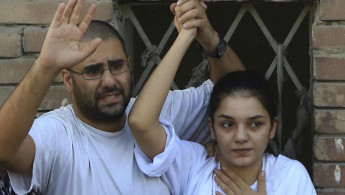Egypt court reduces protester sentences to 2 years
An Egyptian appeals court on Sunday upheld the conviction of 23 activists, including a prominent rights defender, for staging an illegal protest, but reduced their sentences from three years to two, a defence lawyer said.
The judge did not explain his decision, according to defence lawyer Mohammed Abdel-Aziz, who said the reduction was not an act of clemency.
"They are still convicted. This decision has no meaning at all," Abdel-Aziz said after the court decision was read out.
Egyptian judges often do not explain their verdicts until a few days after they are issued.
The defendants will also get two years' probation after their release, but will not have to pay a previously imposed fine of $1,400 each. The decision can be appealed.
The defendants include Sanaa Seif. Her brother Alaa Abdel-Fattah is also in prison pending a retrial after appealing a 15-year sentence for violating the protest law.
Yara Sallam, a prominent women's rights activist, was also among the defendants whose sentences were reduced.
London-based rights group Amnesty International and Abdel-Aziz said the trial, which also included charges of sabotage, was based on little evidence.
"This appears to be yet another show-trial based on scant and dubious evidence that is intended to be a clear warning to anyone who defies the Egyptian protest law," Amnesty said back in September.
It also criticized Sallam's detention, saying she was not even at the protest but was detained because of her human rights work.
The pro-democracy activists had taken part in a demonstration on June 21, violating a law that banned protests without a permit.
The defendants are known as the "Ittihadiya protesters" in a reference to an area near the presidential palace in Cairo where the protest took place.
In October, they were sentenced to three years for violating the law and "assaulting security forces".
That has now been reduced to two years, and ordered to be under police supervision for an additional two years once they are freed from prison.
'Revolutionaries behind bars'
The mother of one of the detainees, Amal Mahrus, decried the verdict.
"The revolutionaries are all in prison, the corrupt and the thieves are all free," she said outside the courtroom.
The sentence can still be appealed before Egypt’s highest legal authority, the Court of Cassation.
| If their fathers were generals they would have been acquitted. -Khalid Ali, defence lawyer |
Activists have responded to the sentencing with anger, especially after a recent leaked recording seemed to indicate that high-ranking officials in the ministry of defence, as well as the office of President Abdel Fattah al-Sisi, have been colluding to have a police officer’s sentence reduced.
In that recording, Mamdouh Shahin, the Minister of Defence’s assistant, and Abbas Kamel, the head of the Presidential Office, discuss how to overturn a judge’s decision to not accept the defence’s witnesses in the case of a police officer being tried for the death of 37 prisoners in the back of a police truck in 2013.
"Damn this oppression, two years instead of three for the Ittihadiya youth, and the one who kills 37 gets one year suspended. Prison has never defeated an idea," said Gamal Eid, a prominent human rights lawyer, on Twitter.
This was echoed by Wael Eskandar, a journalist, who accused Sisi of being behind the decision.
"We can safely assume that Sisi manipulated the judiciary to sentence Yara, Sanaa and others to two years in prison," Eskandar said.
Not everyone agreed – Ahmed Wagih, a pro-Sisi Twitter user, sarcastically told those angered by the decision should have told the defendants not to have gone to the protest.
"Once again, don’t break the law dear, so that you don’t enter prison," Wagih said.
Egypt has witnessed a crackdown on dissent since ex-army chief and now President Abdel Fattah al-Sisi toppled Muslim Brotherhood president Muhammed Morsi in a coup in June 2013.
At least 1400 people have been killed and thousands imprisoned in a crackdown on Sisi's opponents. The president's supporters accuse their opponents of supporting 'terrorism'.
Additional reporting by agencies.





 Follow the Middle East's top stories in English at The New Arab on Google News
Follow the Middle East's top stories in English at The New Arab on Google News


![22 Arab countries at COP29 have rejected the targeting of fossil fuels [Getty]](/sites/default/files/styles/image_330x185/public/2024-11/GettyImages-2184289638.jpg?h=199d8c1f&itok=ptHl5bec)